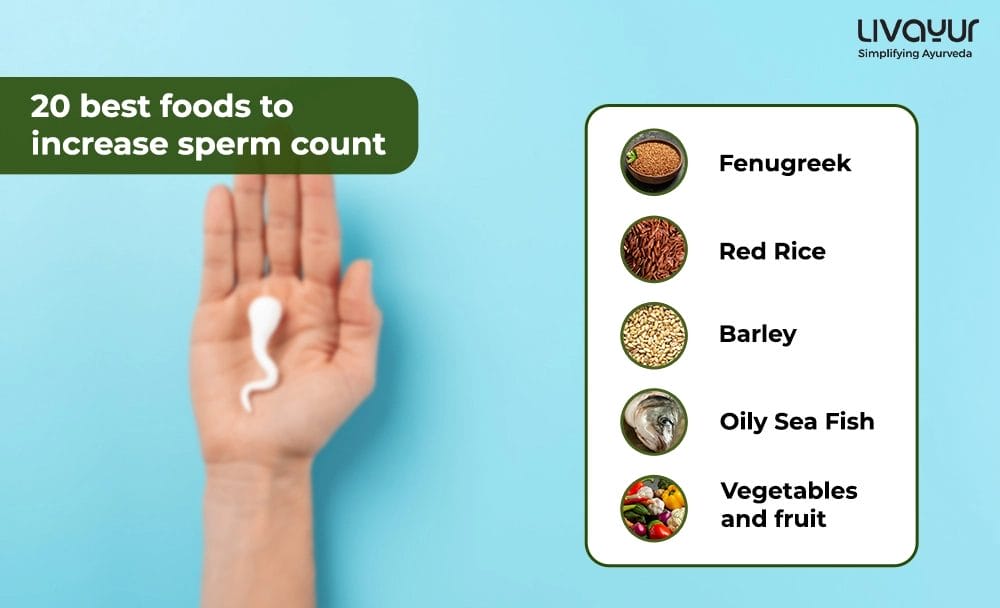
Sperm cells are tiny yet powerful contributors to the miracle of life. These minuscule male reproductive cells carry the genetic material necessary for fertilization. Sperm count denotes the concentration of sperm present in a given amount of semen, as a healthy sperm count is vital for successful conception. Sperm motility denotes the sperm cells’ ability to move swiftly and effectively. High motility is crucial as it aids sperm in reaching and fertilizing the egg.
Over several years, there has been a concerning decline in human semen quality worldwide, especially in developed nations, because of lifestyle, such as unhealthy diets, sedentary lifestyles, and environmental pollution. [1]
Research into the correlation between diet and semen quality has found that foods rich in fiber and antioxidants, such as vegetables, fruits, nuts, and whole cereals, have positive associations with sperm quality. Similarly, fish, seafood, shellfish, poultry, and low-fat dairy products have demonstrated beneficial effects. Thus, embracing healthy dietary patterns has revealed a positive relation between sperm concentration and motility. [1]
According to Ayurveda, Vajikarana and Rasayana are significant aspects of the Ashtanga of Ayurveda. Vajikaranakarana Tantra, recognized as Aphrodisiac Therapy, focuses on enhancing Sukra Dhathu (sperm) count, improving quality, and boosting sexual vitality between partners. [7]
In this article, we will learn about what food to eat to increase sperm count.
Causes of low sperm count
Medical Causes
- Varicocele Impact: Swollen scrotal veins can decrease sperm quantity by over 50% and lower testosterone levels, affecting sexual function.
- Infections’ Influence: Epididymitis, orchitis, and sexually transmitted infections like gonorrhea or HIV can hinder sperm production and cause scarring, potentially blocking sperm passage.
- Ejaculation Challenges: Retrograde ejaculation, caused by conditions like diabetes, prostate issues, spinal injuries, or bladder surgeries, leads to semen entering the bladder instead of exiting the penis.
- Anti-Sperm Antibodies: Immune cells mistakenly identifying sperm as invaders can attack and impair their function.
- Factors Affecting Tubes and Hormones: Various factors such as tubule defects, hormonal imbalances, inherited disorders like Klinefelter syndrome, celiac disease affecting nutrient absorption, certain therapies (testosterone replacement, anabolic steroids, cancer medications), and surgeries (vasectomy, hernia repairs, etc.) can significantly impact sperm production and fertility. [2]
Environmental and Lifestyle Causes
- Industrial Chemicals Impact: Prolonged exposure to pesticides, solvents, herbicides, and lead in workplaces can contribute to lower sperm counts.
- Heavy Metal Exposure: Contact with toxic metals like mercury, cadmium, or lead can lead to infertility.
- Radiation and Overheating: Exposure to radiation or X-rays can decrease sperm production while overheating from saunas, hot tubs, or extended laptop use can temporarily impair sperm count.
- Sedentary Lifestyle: Extended periods of sitting or wearing tight clothing can raise scrotal temperature, affecting sperm production.
- Substance Use and Stress: Anabolic steroids, cocaine, marijuana, and excessive alcohol consumption can lower testosterone and reduce sperm quality. Emotional stress, particularly about fertility issues, can interfere with hormone levels necessary for sperm production, potentially damaging sperm.
- Obesity and Health Implications: Defined by an energy imbalance, obesity (BMI above 30 Kg/m²) contributes to chronic conditions like diabetes and heart disease and impacts fertility adversely. Depression and improper sperm testing methods can also negatively influence sperm concentration. [2]
Dietary Patterns
- Carbohydrates’ Impact: Excessive intake, notably common in some Asian societies, correlates with abnormal sperm motility and DNA damage.
- Junk Food and Saturated Fats: Diets high in junk food and saturated fats significantly reduce sperm count and concentration compared to lower intake.
- Caffeine’s Influence: High caffeine intake, found in coffee, tea, and beverages, has been linked to increased testosterone levels but might hinder male reproductive potential by interfering with Sertoli cell functions. [2]
Role of diet in sperm count
The decline in semen quality has been attributed to the prevalence of a Western diet. This diet, high in processed meats and red meat, fatty dairy, alcohol, sugary foods and drinks, coffee, and low in whole grains, fruits, vegetables, fish, seafood, nuts, poultry, and skim dairy, adversely affects semen parameters, leading to reduced fertility. [3]
As per Ayurveda, the Ahara Dravya category encompasses various types of grains, primarily classified as Shuka Dhanyas (cereals), Shali Dhanya (cereals), Vrihi Dhanya (cereals), and Truna Dhanya (millets). These grains share common properties, such as being sweet (Madhura), unctuous (Snigdha), heavy (Guru), and having a cold potency (Shita). Among these, the Shali Dhanya group notably holds aphrodisiac properties, known as Vrishya in Ayurveda. [7]
20 foods to increase sperm count
1. Fenugreek
Fenugreek has shown promise in boosting sperm count. A supplement containing fenugreek seed extract and minerals, taken daily for six weeks, shows enhancements in libido, sexual performance, and overall strength. [4]
2. Zinc-rich foods
Insufficient zinc levels are linked to reduced testosterone, poorer sperm quality, and a higher likelihood of male infertility. Additionally, supplementing with zinc-rich foods such as avocados boosts testosterone levels and sperm count in individuals with low zinc levels. [5]
3. Red Rice
Shashtika Sali is classified under Vrihi dhanya, while Raktha Sali is categorized under Shuka dhanya. Both types help maintain energy and freshness, contributing to increased sexual potency. [7]
4. Barley
Barley or Yava possesses a range of properties, including being dry (Ruksha), heavy to digest (Guru), sweet (Madhura), laxative (Sara), relieving intestinal gas (Vatanulomana), aphrodisiac (Vrishya), and stability-enhancing (Sthairyakara). It is suggested as a daily dietary inclusion (Nithyasevaniya Ahara) for sperm motility. [7]
5. Oily sea fish
Including fish and seafood like salmon and sardines in one’s diet provides essential DHA and EPA, crucial for semen quality enhancement. [6]
6. Vegetables and fruit
Eating raw vegetables and fruits forms the foundation of nutritious diets linked to enhanced semen quality and fertility. [6] The Saka varga constitutes an important dietary group in Ayurveda, divided into Phala saka varga, Patra saka varga, Kanda saka varga, and Salana saka varga. These possess light digestion unctuous properties and act as dosha pacifiers, aphrodisiacs, and laxatives. [7]
7. Nuts and Seeds
Selecting raw and unsalted nuts and seeds such as Brazil nuts and pumpkin seeds is crucial. Including nuts in your diet might positively impact sperm quality as they are known to be the best foods to eat to increase sperm count. [6]
8. Whole-grain products
Opt for whole-grain products over refined flour to boost fiber intake and enhance nutritional value. [6] Godhuma or wheat is characterized by its aphrodisiac nature (Vrishya), cooling effect (Sita), enlivening properties (Jivana), strength enhancement (Sthairyakruth), and mild laxative effects (Sara). [7]
9. Lean dairy
Choosing low-fat dairy products is advantageous as they contain reduced saturated fat levels. It is also believed to be the best food to increase sperm count. [6]
10. Olive oil, rapeseed oil
Replacing saturated fats with healthy vegetable oils rich in unsaturated fatty acids is recommended. [6]
11. Black Gram
Black gram or Masha is a part of the Shimbidhanya varga, playing a significant role in Vajikarana therapy, an aphrodisiac treatment in Ayurveda. [7]
12. Goji berries
These are believed to enhance mood and scrotal temperature, and might improve sperm motility and fertility.
13. Green Gram
Green gram or Mugda falls under the Shimbi dhnaya varga and is recommended for daily consumption as it increases male fertility. It possesses an astringent-sweet taste, catabolic post-digestive effect, and cold potency. It’s beneficial for conditions related to Meda, Sleshma, and Raktapitta. [7]
14. Spinach
This has folic acid, which maintains sperm shape, preventing abnormalities and congenital disabilities.
15. Walnuts
These are high in omega-3 and antioxidants that improve sperm health.
16. Asparagus
This is abundant in Vitamin C, which boosts semen volume and enhances male fertility.
17. Tomatoes
The lycopene in tomatoes boosts sperm health and is counted among the top foods to increase sperm count and motility.
18. Pomegranates
The antioxidants in pomegranate juice protect sperm from damage.
19. Garlic
The compound Allicin in garlic improves blood flow to male sexual organs, positively impacting sperm count. It has Tikshna (penetrating) and Ushna (hot potency) properties. [7]
20. Lentils
Lentil’s spermidine content benefits male fertilization and is considered a great Indian food to increase sperm count.
FAQs
1. Which fruits are considered the best food to increase sperm count fast?
Fruits offer crucial vitamins and minerals that enhance fertility. You can consider the top 5 fruits like bananas, apples, pomegranates, avocados, and dark berries. These fruits have the potential to impact sperm health positively.
2. What beverages can boost sperm count?
Drinks rich in antioxidants, like Vitamin C found in citrus fruits, may aid male fertility. Consider 100% fruit juices like orange or grapefruit juice, offering similar benefits to consuming these fruits directly
3. Can milk increase sperm count?
Regular consumption of full-fat dairy products may reduce sperm count and motility. Opting for low-fat or skim milk and alternatives like almond milk or coconut milk might be a better choice for maintaining sperm health.
4. Which dry fruit is best for sperm health?
If you wish to have an answer to ‘how to increase sperm count by food’, you must know that dry fruits like walnuts, loaded with Omega-3 fatty acids and antioxidants, have been linked to improved sperm quality, thus increasing the chances of conception.
5. How can I thicken sperm?
To naturally increase sperm count and thickness, consider the following:
• Abstain from ejaculation for 2-3 days to improve sperm thickness.
• Consider supplements rich in vitamin E and zinc to promote thicker sperm.
• Consuming raw pumpkin seeds may also support an increase in sperm thickness.
Conclusion
Incorporating the top 20 best foods to increase sperm count and motility can significantly impact male reproductive health. These nutrient-rich foods, from oysters and pumpkin seeds to dark chocolate and citrus fruits, offer a diverse array of vitamins, minerals, and antioxidants vital for sperm health. Including these natural foods to increase sperm count in a well-rounded diet may promote better sperm quality, increased counts, and enhanced motility, offering promising prospects for improving male fertility naturally.
Disclaimer
This article is written from a health and wellness perspective and is not medical advice.
Kindly seek the help of a certified medical practitioner before initiating any treatment.
References
- Diet and sperm quality: Nutrients, foods and dietary patterns
- Role of nutrition and associated factors in oligospermia (Low sperm count). The Pharma innovation
- Overall effect of diet and nutrition on spermatogenesis
- Physiological aspects of male libido enhanced by standardized Trigonella foenum-graecum extract and mineral formulation
- Zinc is an Essential Element for Male Fertility: A Review of Zn Roles in Men’s Health, Germination, Sperm Quality, and Fertilization
- Diet and Nutritional Factors in Male (In)fertility—Underestimated Factors
- Ayurvedic Food Supplements for Sexual Health: A Review Article

















